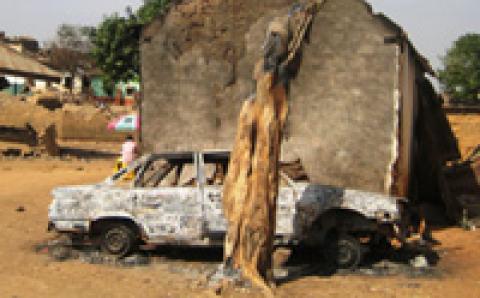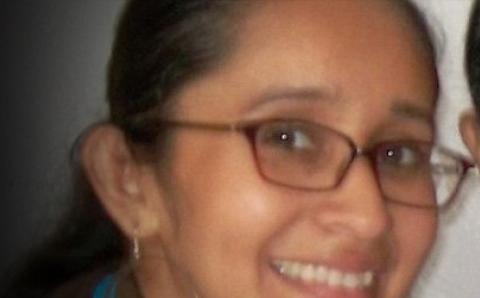As the Christian Reformed World Relief Committee prepares to celebrate its 50th birthday in 2012, The Banner’s news editor sat down with co-directors Andrew Ryskamp and Ida Mutoigo. Ryskamp has been with CRWRC since 1974 and director of CRWRC-US since 1998. Mutoigo has been with CRWRC since 1985 and director of CRWRC-Canada since 2006.
Homes being built after the earthquake in Haiti.
Q: As you look back over your history with CRWRC, what words come to mind?
AR: For me, it’s an ongoing journey of spiritual growth. For the organization, it has been ministry growth.
IM: God’s grace, especially as I reflect on the deep generosity of people in our churches and how that has grown, the generous heart for people in poverty and disaster.
Q: In its history, what has CRWRC excelled at, and what do you wish could have been done better?
IM: The partnership model is our strength. Partnering with local organizations is a strong achievement. Other key achievements is the whole Disaster Response (DRS) programming, the quality of that in North America and internationally. It’s been a real highlight to see the expansion of money of we have managed and leveraged in terms of grants and partnerships.
From the field level, I would have liked to have done more integration of worldview and values transformation at an earlier stage. We could have had so much more impact.
AR: Community strengthening with involvement of the church has been central.
What I wish we would have been able to accomplish more strongly is the involvement of the church in North America in that, and the understanding they have of the principles involved in good development. We want our denomination, our churches, and our donors to be so involved in our work that they not only support the work internationally, but incorporate the same principles at home for transformation of their own communities.
Q: What do you see as milestones?
AR: For me two things make the most impact. One is watching a child die from malnutrition. Once you see that, you never want to see it again. The other one is when you sit in a community that is Muslim, and you [know that] you can save hundreds of lives in terms of the physical sense—but when you know it’s having a spiritual impact, that’s huge.
The tsunami was huge, but what’s memorable is sitting with community leaders whose homes are rebuilt, but they don’t know what to do with their grief. We’re able to talk about that from our own faith perspective. That doesn’t require a tsunami to happen. Poverty is the tsunami of everyday life.
IM: In terms of disasters, Katrina and the tsunami were key. Katrina in the U.S. opened up volunteerism, and we’ve connected with thousands of volunteers. In terms of poverty, the whole Bangladesh program, how [the people] connected from local organizations to institutions that address whole regions through strong local ownership affecting large numbers. In terms of justice, [it is] West Africa, where an irrigation scheme was going to shift people off their land with no compensation and they were able to negotiate through advocacy a more reasonable settlement.
Q: As you look at CRWRC right now, what are the bright spots you see?
IM: Some of the bright spots I see are an expanded audience of interested donors in North America beyond the CRC, and a lot more openness of other churches and other alliances to joining us. These give a huge opportunity for greater impact, and then there are the global alliances. Another bright spot is the stronger justice orientation of youth and young adults. There is a huge opportunity for us to tap into that. Volunteerism—groups coming into DRS—is another bright spot.
AR: It’s sort of humbling that we’ve become an agency of choice to partner with. The other is that people want to partner with us because they appreciate [our] philosophy of ministry, our approach to the countries, community empowerment.
Q: As you look ahead, what are the challenges you see?
IM: Like all charities, we face greater scrutiny and skepticism. When people find us, it takes a lot of work [to overcome skepticism] because it’s like people start with a distrust level, rather than assume [we are] worthy of investment. The other trend is more interest in designated giving, so money that can support the core of what we do is harder now to raise. People are drawn more into a disaster mode, yet longer term it is so important to mitigate against the disasters.
AR: For me it is addressing injustice. Justice has been politicized in North America, so raising issues that are systemic in nature to the causes of what we face on the field are more difficult to address. When we start talking about a justice issue, people may interpret it as a left-leaning political stance as opposed to seeing it as biblical justice called for in Isaiah 58.
Q: You told the Board of Trustees of the denomination about the choices the CRC has to make about the role of CRWRC looking ahead. Can you say a bit more about that?
AR: We’ve become a player in the field of global NGOs, but there are people who would still like us to be more of an in-house diaconal ministry, an extension of deacons’ work. They would like us to just work with Christian Reformed World Missions and Christian Reformed Home Missions and limit us to what we can only do together.
What we’re saying is, if we unleash the potential that exists in CRWRC and other agencies, we can unleash a whole movement of ministry involvement in the denomination. It would be less contained; it would be a ministry explosion. CRWRC is not concerned about just the CRC. We connect with the global church through ACT Alliance and other [organizations]. Those are partnerships that we have connected with that have even bigger possibilities for reaching even more people than just [in-house] collaboration.
IM: Through Canadian Foodgrains Bank, in one year we might generate around $1 million in support from the CRC. But because we are a lead organization to implement those programs on the field where food security programs are needed, we manage $10 million. It multiplies the impact that CRWRC is able to have and leverages resources we received to do much more.
That’s where the CRC, then, is at a crossroads. Structurally, managing an organization with over 100 employees and a budget of $40 million (about half the denomination’s budget, excluding Calvin College), demands a different system or structure to make it flourish and grow rather than one that keeps it under an umbrella. An umbrella closes in. We see it upside down—connected and rooted in CRC but open to continue to grow and flourish. Can systems of the denomination flex enough to allow an agency to have growth potential to flourish without tying it down to the restrictions that fit for the others and without losing the connection to our constituents?
Because we don’t want [the CRC] to feel like we’re World Vision or a lesser priority. [The CRC] is the source through which we can then leverage all these other partnerships. That’s a very important relationship to us.
Q: What do you want the church to focus on during this anniversary year?
AR: Celebrate what a relatively small denomination is able to accomplish in ministry worldwide, not only through CRWRC but through all of its ministries. For a small denomination to be recognized internationally at government levels and at other alliance levels, the impact is disproportionate to size of denomination.
IM: I hope we really celebrate the heroes in the communities, the ones that are really on the frontlines. We don’t often hear about them or see them, the lives that are being changed, the faithful mothers who volunteer to train other mothers; partner staff, some who have died in service because of risks encountered; to celebrate and appreciate God’s work through these strong Christian leaders who had a heart for their community.
About the Author
Gayla Postma retired as news editor for The Banner in 2020.









